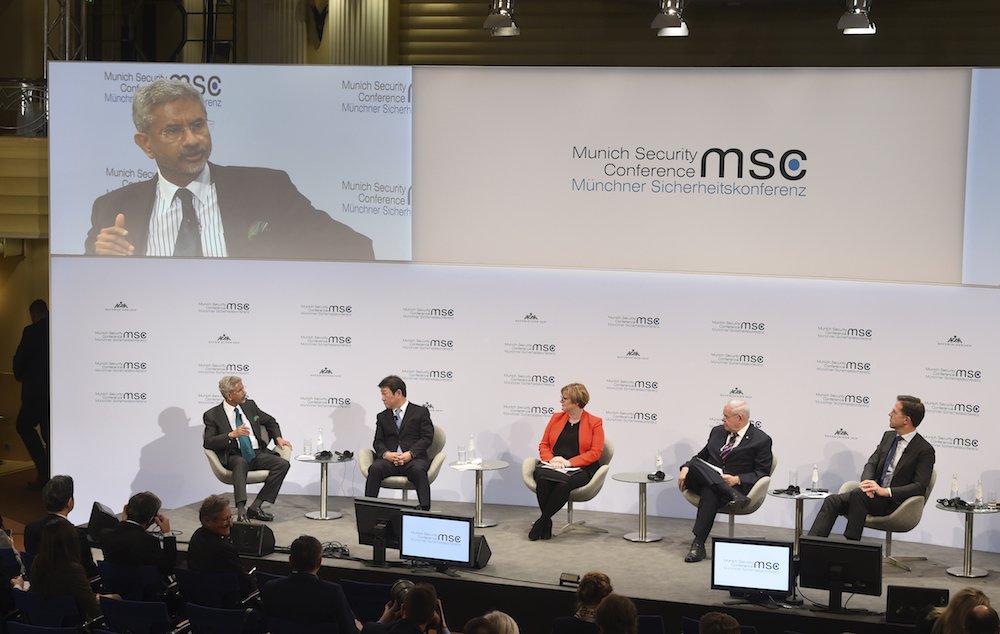
- ARAB NEWS
- 01 Jul 2025

As international leaders gathered for the 56th Munich Security Conference last week, faced with the combined challenges of an Iran cut loose of its nuclear agreement, the outbreak of a frightening new virus and an EU at an impasse after the UK’s withdrawal, a sense of trepidation reflected the gathering’s theme of “Westlessness.”
Defined as a widespread feeling of unease and restlessness in the face of increasing uncertainty about the enduring purpose of the West, the sentiment was all too clear in Munich, as the old diplomatic platform of summitry seemed a hopelessly ill-equipped paradigm to challenge the faceless foes of contemporary international relations. Whereas last year the summit was overcome by the concern of global leaders at Donald Trump’s whirlwind of arbitrary international policy decisions and the impact they would have on longstanding alliance systems, this year the very durability of the post-1945 status quo was brought into question.
The myriad complex foreign policy challenges facing the West are wholly unrecognizable from the east-west nuclear issues that governed global affairs in the late 20th century. The attempts by political scientists at the end of the Cold War to understand an “end of history” and “clash of civilizations” in a US-led unipolar world have similarly been brought into question by an America too distracted to exert influence on the world stage, as well as a Western alliance system weakened by infighting and outmoded mechanisms for dealing with rapidly changing threats. Put simply, though American allies may want to exert more unity and strength on the world stage, they currently lack the vision and consensus to do so.
The Munich summit, which is normally considered a useful barometer for the health of the transatlantic relationship, was surprisingly well attended. The US representation gave every impression that the White House was keen to placate European allies. Two senior government ministers and one retired secretary of state, senior congressmen, and other influential delegates belied a strong US presence. At the conference, which was North Korea’s first, Secretary of State Mike Pompeo underlined that American power wasn’t to be measured in US guns and lives, but rather through the export of its values. Questioning the increasingly mute voice of the West concerning the major international issues of the day, he reminded delegates that: “The West doesn’t define a space or piece of real estate. It’s any nation that adopts the model of respect for individual freedom, free enterprise, national sovereignty.”
Though American allies may want to exert more unity and strength on the world stage, they currently lack the vision and consensus to do so.
Zaid M. Belbagi
American platitudes about freedom could not, however, detract from the very serious issue of rising autocracy in the world. The increasing impunity with which China and Russia act on the world stage, and their clear disregard for rules-based international relations, has had huge implications for the Western alliance system. The unipolar US order, the Pax Americana or the world’s American moment is looking increasingly frail amid an ever-expanding set of threats and challenges.
In the Middle East, the reticence of several American administrations to implement a long-term plan has led to it surrendering the strategic high ground. The announcement of a US withdrawal from Iraq last month raised alarm bells across the region and illustrated the extent to which Iran had displaced Iraq’s traditional Arab allies and hollowed out the gargantuan American efforts to rebuild Iraq and court its government. To Prince Saud bin Badr of the Saudi delegation, one of a cadre of impressive young officials increasingly at the forefront, the American presence in the region is critical to issues of disarmament. “Them being at the table changes everything, especially with regards to the enforceability of disarmament agreements and working toward a nuclear-free Middle East,” he said.
Though the president of the summit Frank-Walter Steinmeier opened the conference with words of lamentation, warning how the current US administration “rejects the very concept of the international community” and has become “‘great again,’ but at the expense of neighbors and partners,” the West has a real opportunity to reconfigure the international order and no longer to see security issues “through American eyes.” If the world’s democratic powers wish to live in a peaceful world, they must come together to exercise strategic autonomy based on maintaining hard power capabilities and expounding neoliberal principles of interdependence to lessen the effects of the growth of the world’s autocracies.